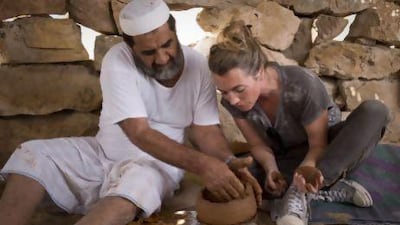RAS AL KHAIMAH // Ruth Impey is an Abu Dhabi-based potter on the hunt for mountain clay.
Finding clay sources in the Hajjar mountains should be easy: commercial pottery production at the foot of the mountains thrived with the growth of the medieval trade port Julfar. And Impey is confident that those clay sources still exist.
But the last potters are thought to have died long ago and commercial production in the UAE ended with the advent of plastic.
It is Impey's dream to revive pottery production in Wadi Haqeel by re-establishing clay sources that can be used by local artists and school children. Clay, she says, can open a window into Emirati history.
"[I] realised there was a massive story that hasn't really been told," says Impey, a Glaswegian who started potting three years ago through an apprenticeship at Abu Dhabi Pottery with Homa Vafaie Farley, an Iranian.
"...All the clay that we used at the moment in the studio or in schools that I work with is imported from Europe and that's not very satisfactory to me," Impey says. "I would like to make a pot that's not only made in the region but it's from the region."
To document traditional techniques, resources and firing methods, Impey will work with academics, museums and tribesmen. The Pottery Research Project will catalogue and create an archive of existing research on pottery from every emirate, document the works and stories of local potters and analyse historic and modern clay sources.
"For me my ideal dream would be to create a body of work with clay sourced from the region and also to revive the tradition to a certain degree and to try and tell the story of the potters that used to work here," she says.
Last week Impey travelled to Wadi Haqeel in Ras Al Khaimah to meet Ahmed Rashed, a potter's son who equates pottery with backaches.
Seated on the hard earth of his father's old stone hut, Mr Rashed coils moist clay into pots. "My father, because of this, he suffered with his back for a long time," he says as he smoothed a pot with a seashell.
Mr Rashed is in his 50s and one of the last craftsmen in a profession that sustained Wadi Haqeel for more than 600 years.
The wadi was famed for its Julfar ware, a coarse, unglazed pottery produced in the area from the 12th to 20th century. It was one of the commercial production centres at the foot of the Hajjar mountains on the northeast coast. The remains of at least 20 kilns built of stone and carved into Wadi Haqeel's earth can be seen to this day.
Production peaked from the 15th to 16th centuries when Julfar, 7 kilometres northwest, was at its height.
Clay helped build the city's wealth. Pottery was not prized like Gulf pearls, but clay pots carried water that sustained sailors on dhows across the Indian Ocean. Mountain tribes even built large vessels into the foundation of their homes for storage.
"The significance of Wadi Haqeel is that it's really the last place of a very large industry, probably one of the only big industries of a pre-oil United Arab Emirates," says Christian Velde, a resident archaeologist at the RAK Department of Antiquities.
"[It was] an industry which produced pottery not only for Ras Al Khaimah but for all the rest of the UAE and even beyond. We know pottery has been found in Bahrain, on the other side of the Gulf and even as far as the coast of East Africa."
With clay on his shirt and sweat on his brow, Mr Rashed has no nostalgia for his father's craft.
"If men had to work, they worked," he says.
He can only recall the basics but believes his ancestors crafted huge vessels that could take a week to build.
It was gruelling work. Families had to grind mud from stones and collect enough wood to make a fire that could burn at over 700° C for four or five hours. Red, gray and yellow clay were mixed in different proportions to get a desired effect.
Impey returned to Abu Dhabi with a bag of moist clay and two sacks of dirt, a gift from Mr Rashed.
The next step will be to rebuild a medieval kiln for firing pots made using traditional techniques. Impey envisions a visitors centre where people could see the clay being fired.
This week she will test what temperature the clay can withstand in a modern kiln. If it can withstand 900° or 1,000° C, she will be able to use modern glazing techniques. Other minerals in the Hajjar mountains could be used in modern pottery production.
"The story behind what they did is very important and I think it's been a forgotten story that is a part of the cultural narrative and I think now people are beginning to reflect back on it," Impey says.
With her work, locally sourced pottery will not just tell the story of the country's history, but also its future.

